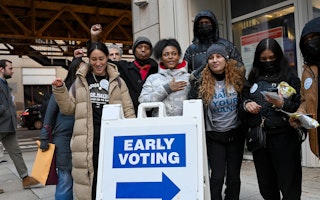Maryland DREAMers Give Me Hope
“So happy all my friends get to go to college!” This is what my daughter, a sophomore at Trinity College, texted me when it became clear, late on election night, that 58 percent of voters had approved the Maryland DREAM Act, which will help thousands of undocumented students access higher education in the state over the next several years. A rush of tears came to my eyes, surprising me. It was a mixture of parental pride, patriotism, and hope.
Last summer Chloe worked with CASA de Maryland, going from festivals to farmers’ markets to educate people about why all young people, including undocumented youth, should be able to attend college. Many of the undocumented students knew no other country than the U.S., having been brought here as little children, and had worked hard in school to prepare for lives here as responsible working adults.
The Maryland DREAM Act was enacted by the state legislature in 2011. Legislators knew that out-of-state tuition was unaffordable for most citizen students and for virtually all undocumented students, dashing their dreams regardless of drive and academic achievement. Joining 13 other states with similar bills, the Maryland legislature recognized that it made good economic sense to make higher education more accessible: trained young people attract good jobs to the state. Governor O’Malley felt that passing the DREAM Act was about fairness. He saw the need to protect every child’s dignity and understood that all children are assets to the state. Mayor Rawlings-Blake viewed immigrant young people in a historical context—like those before them, they grow the city’s population and encourage entrepreneurism.
Chloe viewed the DREAMers as her peers and friends. Yes, in many ways they had quite different life experiences. The DREAMers’ questions about what country she had come from gave Chloe new interest in her own Russian-Scottish ancestry. And her friends’ daily economic worries made clear the reality of the growing inequity in the country, the 37.4 percent poverty rate for children and youth in Baltimore, and the low paying jobs available to many immigrants. But, mostly, the DREAMers offered friendship and her first adult experience of taking on a serious issue using collective action and seeing firsthand that justice for one group contributes to the prosperity, safety, and health of us all.
While Chloe and her new friends were aware—and spoke frankly, if sometimes uncomfortably—about their different economic situations, they mainly felt that they were part of the same team. They believed that race, class, xenophobia and gender inequality were inextricably linked. And, like other members of the Millennial Generation, they had a fluid sense of their own identity, shifting with the context. These young people identified building community and cooperation as the way to create a better society. They believed that the general public’s lack of awareness about the systemic causes of economic disparities and the root causes of migration often block change.
Their work, though, extended far beyond that of Chloe and the DREAMers. Half of the young people eligible to vote took to the polls this year—surprising observers who thought that the huge turnout in 2008 was an aberration. In Maryland, they constituted 19 percent of the total electorate. As part of the “rising American electorate,” these young people joined the emerging political majority of African American, Asian American, Latino, Native American and single women voters that had a determinative impact. Particularly focused on equality and fairness, the Millennials responded to ballot issues such as the Maryland DREAM Act, and their votes, in Maryland and in other states, made a difference. Others, including 68 percent of African-American voters, also provided critical support to the protection of the Maryland DREAM Act.
Which brings us back to election night and my own emotional surge. The DREAMers’ sheer joy at their victory and the chance to receive a college education re-connected me to the grand American Promise—that hard work and individuals and communities pulling together can keep this country great, refueled, re-imagined, and forward looking. Developing and unleashing the talents of the DREAMers make perfect sense—keeping Maryland’s workforce strong, expanding our tax base, and encouraging the innovation that the most diverse group of young people in the country’s history can produce. But, I was most moved by the DREAMers’ passionate desire to be an active part of this country and the Millennials’ decisive action for inclusivity and fairness. These young people thrill me; they give me hope.


